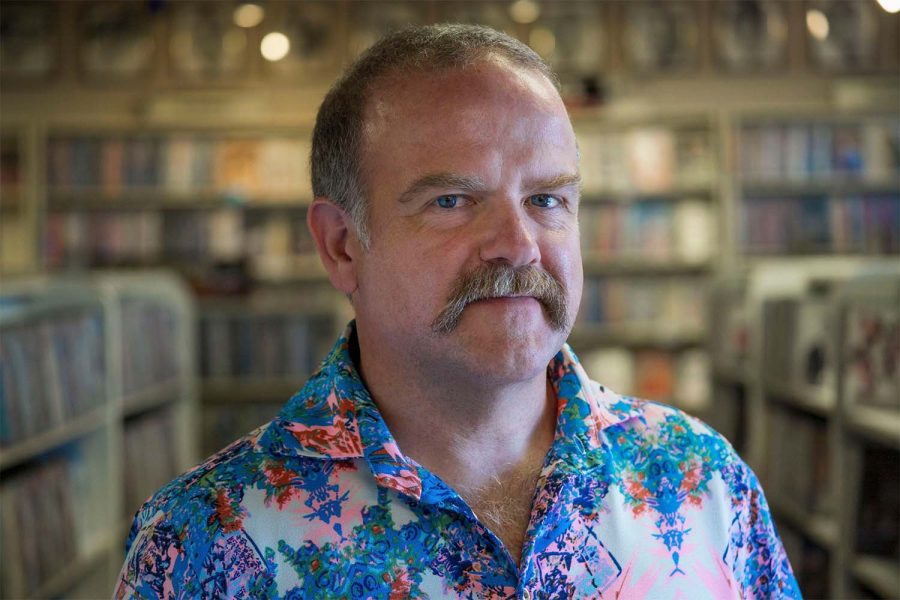Ask the Author | Ander Monson
Ander Monson will read from his new book ‘Predator’ on Thursday, Nov. 3 at FilmScene in Iowa City. Prior to his reading, FilmScene will screen the movie ‘Predator.’
November 1, 2022
Author Ander Monson founded Diagram, the third-oldest online literary magazine. Monson currently lives in Tucson, Arizona, and teaches at the University of Arizona. He received his bachelor’s degree from Knox College, his masters from Iowa State University, and a Master of Fine Arts from the University of Alabama. Monson will read from his new book “Predator” on Thursday at FilmScene in Iowa City. Before his reading, FilmScene will screen the 1987 movie “Predator.”
The Daily Iowan: Why did you decide to write a book about “Predator”?
Monson: “Predator” is a movie I saw when I was 12. I saw it at a fairly, in retrospect, dark time in my life. My mom had died. My friend’s sister had been killed. Another friend’s mom died. Another friend blew his hand off making bombs. It was then I discovered this movie. I watched all these action movies of the ‘80s. I thought they were the best, and they kind of parented me in a way. Jan. 6 happened while I was writing this book, and I’m like, “These guys are action movie fans like me.” I don’t know whether it’s white guys of this generation or there’s something f*cked up, and it doesn’t always manifest itself in bad ways. But like, what did we watch? What are the things that we learned? I rewatched “Predator” and was like, “Oh, but this is the movie.” Then, I went really down the rabbit hole in this movie because I didn’t understand this movie. It’s like those other movies, but it’s trying to satirize those movies. Almost all the subtle messages in the movie are ones that like these guys with big guns do not seem to want to internalize. “Predator” is a movie about, like, the limitations of guns. Like they have all the guns in that movie, and they still get killed. They have all the American power, and they still get killed. They’re the ones that are invading this other country, and they still get killed because there’s always something more badass than you. It’s like the limits of technology and the limits of colonialism — and frankly —the limits of masculinity. So, the more I started to rewatch this movie, I’m like, “Okay, I don’t know how to write about gun violence, and like the problem with masculinity, those are too big.” But I do know how to watch “Predator” and read the script for “Predator” and read the novelization for “Predator.”
DI: How did you conceptualize your literary magazine, Diagram?
Monson: This is our 22nd year. I started when I was in grad school at University of Alabama, and I was editing a magazine called Black Warrior review at the time, which was cool. We’d publish a lot of really cool stuff. Had a big staff. But the thing that I found frustrating about it was like, we had a lot of staff that would all read and talk about the submissions, but we would publish the stuff that we agreed on rather than the stuff that was a little bit more ambitious or experimental. That was trying harder, but some people just may not like it, so I was like, “Man, I don’t know,” and I didn’t see it at the time, the kind of work that I was really interested in publishing, which often had like, kind of like visual and text components plural. People didn’t really publish that very much at that point. So, after I ended my time editing Black Warrior, I just started up a magazine myself.
DI: How does working with multiple mediums impact your work?
Monson: I come from a hacker background, and I found out at a certain point I had a copy of Adobe PageMaker but taught myself to do it. If you look at Microsoft Word, even Word has a simulated page in front of you, but there’s all this other sh*t like its header into the bars around it. I just want to find out what those buttons do and play with them, and it’s kind of my relationship with language. Then I learned like PageMaker, I’m like, “Oh, there’s all these other buttons I can do stuff with.” I realized you could then produce a thing that actually looks like a finished text on a page or put an image in it. So, I mean, for me, it’s all kinds of tools like a sentence as a tool, like a column on a page as a tool, like text on a line or on a path. It’s a tool.



